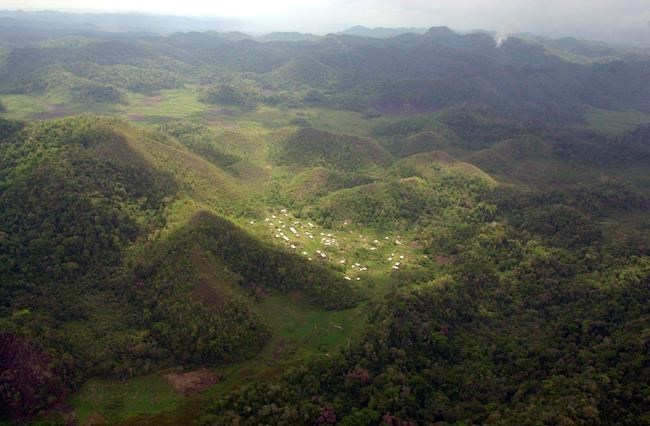
FILE – In this May 24, 2002 file photo, the community of Nuevo Pichucalco deep inside the Montes Azules nature reserve is seen from the higher peaks of the mountains, Chiapas, Mexico. Mexico's few remaining indigenous Lacandon said on Oct. 2019, that settlers are threatening their ancestral home, the last pocket of tropical rainforest in North America. (AP Photo/Eduardo Verdugo, File)
Republished October 11, 2019 - 10:54 AM
Original Publication Date October 11, 2019 - 9:36 AM
MEXICO CITY - The few remaining indigenous Lacandon are locked in a struggle to protect their ancestral home: the last pocket of tropical rainforest in North America.
There are only about 1,500 Lacandones left, scattered in a handful of settlements across the 1,280 square miles (3,312-square-kilometre) Montes Azules jungle reserve on Mexico's southern border with Guatemala.
Over the years, other indigenous groups like the Tzeltales and Choles have settled in the jungle. But these groups plant large fields and raise cattle, something the Lacandones don't do.
Known for wearing their traditional loose white cotton tunics and long hair, the Lacandones practice sustainable low-impact agriculture, clearing small plots and planting a close-packed combination of food crops. They then rotate cultivation to another clearing that has been allowed to rest and recover for several years. They don't have cattle.
In August, residents of the reserve held elections for officials who will finish marking each group's territory in the reserve, and the Lacandones say they were locked out by their more numerous, newer neighbours.
"We know how to preserve the Lacandon jungle," said Chankin Chambor, a leader of the community. "We are the owners of the Lacandon jungle, we conserve it."
He said: "The choles, the Tzeltales devastate the Lacandon jungle. They don't respect Lacandon territory. They introduce cattle, they make pasture for cattle. They intentionally burn the jungle. They illegally cut down trees."
There are arguments on both sides.
A federal official familiar with the situation who was not authorized to be quoted by name said the problem partly involved "financial interests, like receiving compensation payments."
The government spends millions of dollars paying jungle residents for their land under a federal plan to regularize the jungle communities that can't be removed from the reserve, and remove those that are willing to be moved.
Up to now, most of that money has gone to the Lacandones as compensation for settlements that moved onto their land in decades past.
But now, the Chol and Tzeltal residents — who number in the tens of thousands — are tired of the privileges of the relatively few Lacandones.
But there is also a genuine threat of expanding settlements by the Choles and Tzeltales, indigenous groups who used to live further west in the highlands of southern Chiapas state, but moved into the jungle seeking land. Some radical farmers organizations, including the Zapatista rebels, sided with them against the Lacandones, who were perceived as being coddled by the government.
None of the organizations who the Lacandones accuse of being behind the settlements responded to requests for comment.
But the federal official said the threat was real.
"They do want to expand, and control the Lacandon territory to allow more invasions by the allies of their organizations," he said.
At stake are some of the last stands of intact tropical hardwoods, like the mammoth cypress, cedar, mahogany and Guanacaste trees that dominate the jungle. The area is a key habitat for jaguars, birds and butterflies. Some of the jungles lakes are already drying up under the impact of changing rainfall and land-use patterns.
In all, it is a race to save the jungle, and one of the key challenges is to complete the demarcation of the reserve and each group's land.
The Lacandones have travelled to Mexico City to ask for President Andrés Manuel López Obrador to intervene. But given his already-rocky relations with the Zapatista movement — which staged a brief armed uprising for indigenous rights in 1994, and which has long opposed López Obrador — it is not clear if the president will want to get involved.
In order to solve the problem, the groups will have to work together, something that may be difficult to achieve.
"The Choles say they are the majority, the Tzeltales also say they are the majority, so they say us Lacandones are a minority, se we don't matter," complained Chambor.
News from © The Associated Press, 2019